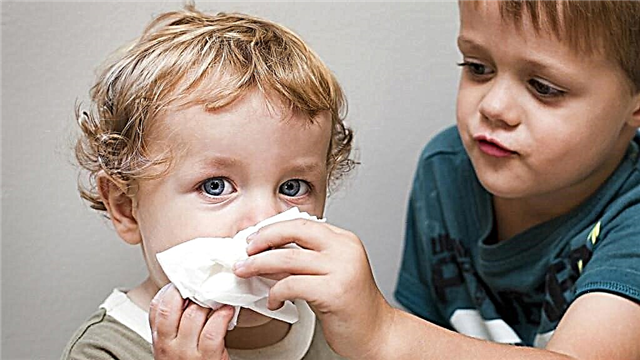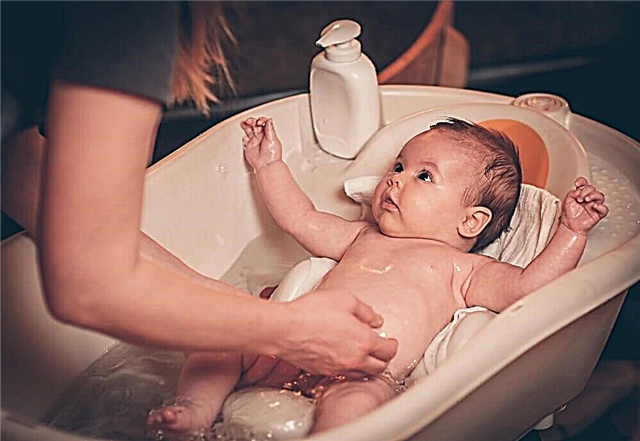You can find out if a newborn baby can hear at the hospital. As part of the compulsory program, all children are tested and, if necessary, are referred for a second procedure or recommended to visit an ENT and audiologist. You can also assess the hearing of a baby at home. Simple methods will make it clear if there are problems, and whether you need to additionally examine the baby.

Newborn
When newborns begin to hear
The hearing organs begin to form in the womb, at 5-6 weeks. At about 5 months, the baby already begins to hear. He remembers his mother's voice if she constantly talks to him. That is why, after birth, it has a calming effect on the baby. The child hears his mother's heart beating, blood moves through the vessels. Babies usually fall asleep well with white noise, which reminds them of previously heard monotonous sounds.
Children, when they are born, already hear, but not in the same way as adults. They do not respond to calm voices or soft music. Babies perceive harsh and loud sounds. This can be easily seen from their behavior. Finally, hearing is formed 8-10 weeks after birth, it is then that the baby begins to perceive mother's voice, to distinguish it from others.
At 3-4 months, the child already understands where the source of the sound is, and begins to twist his head to find it. He tries to repeat what he heard, begins to gurgle. This is the initial stage in the development of speech. By six months, the baby already knows what his name is, responds to his own name, and often smiles at the same time. Gradually, his speech develops, syllables appear, which by the year turn into the first words.
What affects the development of hearing
Hearing problems can be noticed already in the first month of a child's life. The sooner they are detected, the more chances it is to restore it, to avoid a delay in the formation of speech. If the baby is unable to communicate, his interaction with the world will be limited, which will affect his general development and future social adaptation.
Note! In order to identify the problem as early as possible, a hearing test in newborns is carried out in the maternity hospital with a special apparatus. With its help, the procedure is quick and painless.
Hearing impairment can be congenital or acquired. Its development can be influenced by the course of pregnancy, for example, how pronounced toxicosis was in the mother, or, perhaps, she was faced with serious infectious diseases. A child may be hard of hearing if this happened to his blood relatives. Hereditary syndromes are rare, but if they do, they are usually accompanied by lesions of internal organs. Hearing problems can begin if the baby is oxygen deprived or was born prematurely.
Pathology often develops against the background of a head injury or after damage to the eardrum. That is why you cannot clean the ears of the crumbs with cotton swabs, even if they have restraints. It is dangerous to stick something into the ear canal. During hygiene procedures, you need to clean only the outer ear, removing the sulfur that is on the surface. A trauma to the membrane does not lead to hearing loss if the child receives the necessary treatment on time.
Hearing test methods
You can understand whether a child hears well by assessing his unconditioned reflexes. In response to a sound stimulus, he must react in some way. For example, move the arms and legs or pull the eyelids, which is noticeable even if the baby's eyes are closed. The noise can scare a child and dilate his pupils.

The child flinches with his hands, hearing a loud sound
Note! Unconditioned reflexes are present in a child from birth, fade away as they grow older. Normally, they should disappear by 3-5 months of age.
Older babies, starting from about six months, are checked by observing their behavior. When children hear a sharp or unfamiliar sound, they begin to twist their heads, move their eyes, and may freeze or hold their breath. Such an assessment of hearing is not considered one hundred percent, because the baby's reaction directly depends on his mood and well-being.
A more reliable picture is reflected by checks using apparatus. Research helps to understand whether nerve cells are responding to a sound stimulus, and, accordingly, to assess the degree of hearing loss. Also, using the procedures, you can find out how the sound passes through the middle and inner ear, determine how mobile the eardrum is.
Parents should understand that at the slightest suspicion that the baby is hard of hearing, they should consult a doctor. If the baby is really hearing impaired, then early diagnosis will help to avoid delayed speech development.
Newborn's reaction to sounds
Hearing tests in newborns at the maternity hospital are among the mandatory procedures. It is carried out on 3-4 days of a child's life. This can only be prevented by the state of health of the crumbs, if, for example, he is in intensive care or under a dropper.
How to test the hearing of a newborn baby in a maternity hospital:
- During the procedure, the baby should be calm, it is good if he will sleep;
- A special device sends a signal to the ear through a probe. The device responds to certain cells that perceive sound.

Newborn audioscreening
The result of the audio screening is immediately known: the child either passes it or not. If the result is negative, a second procedure is prescribed in 4-6 weeks, usually the baby is sent to the audiological center.
How to test your hearing at home
When the child is at home, he does not respond to the sound of a working TV or radio. The kid sleeps peacefully when adults walk and talk nearby. Some parents begin to suspect that the baby is hard of hearing. To dispel doubts, you can conduct a simple test.
How to test a newborn baby's hearing at home:
- When the baby is sleeping, walk up to him and cough loudly or clap his hands. The sound should not be deafening, but only harsh. The baby will react to him with facial expressions or twitch slightly;
- At the age of one month, while awake, the crumbs make noise from behind or to the side of it. The main thing is that the baby does not see the inspector. You can rattle dishes or grab a loud rattle. If a child hears a sound, he will surely flinch.
Note! When the baby does not react to a sudden noise, does not wake up from the barking of a dog, the roar of a motor, does not show any emotions when something loudly falls on the floor, it is better to consult a doctor.

The kid does not wake up from a sharp sound
Where to go if you have a hearing loss
Hearing tests are performed by an audiologist. He will be able to determine whether there really are deviations, and whether the baby needs increased attention, especially treatment. The audiologist assesses how hard the baby is hearing, selects hearing aids if necessary and helps to solve the problems that accompany hearing loss.
The child may also be referred to an ENT. He diagnoses and treats conditions that can cause hearing problems. Most often, advanced otitis media becomes a provoking factor. However, small objects that children can put in the ear can also damage the eardrum.
Alarming symptoms
Young parents should carefully monitor the baby, especially if the baby has not undergone audio screening in the maternity hospital.
The following facts that require medical advice should be alerted:
- At the age of two to three weeks, the child does not flinch, does not show any reaction to a loud sound, even if he is very close;
- At 3 months, the baby does not perceive mother's voice. When she talks, addresses him, the baby's behavior does not change in any way, as if nothing is happening. Usually, babies at least calm down when they hear their own voice;
- At 4 months old, the baby does not respond to musical toys, is not interested in them. The kid does not turn his head towards them, if they are turned on, does not look for the source of the sound;
- After six months, the baby does not turn around when his name is pronounced;
- At 12-13 months, the child does not say anything, does not even try to repeat the simplest sounds, does not speak syllables, but communicates with the help of gestures.

Normal reaction to a musical toy
Screening, which is carried out in the maternity hospital for all newborns, allows diagnosing congenital hearing loss and taking timely measures so that the child's quality of life does not suffer. It may happen that the child's hearing deteriorates later due to external factors.
What provokes hearing loss
Hearing loss occurs as a result of a number of reasons:
- Intrauterine infection. The organ of hearing is affected by rubella, measles, smallpox, hepatitis, cytomegalovirus, shingles and even ARVI;
- Hypoxia during labor;
- Hereditary hearing loss;
- Birth injury;
- Diseases of the mother, in particular, diabetes mellitus, kidney and liver problems;
- Meningitis;
- Children's infections, namely chickenpox, diphtheria, scarlet fever, measles;
- Low birth weight, which is typical for premature babies;
- Ototoxic drugs;
- Hemolytic jaundice of newborns;
- Otitis media in an advanced stage.
Parents can eliminate a number of factors, which means they can reduce the risk of hearing loss. This applies to the timely treatment of colds, which often cause complications in the ears in young children, and the mandatory vaccination. In addition, uncontrolled intake of medications, which should only be prescribed by a specialist, can harm.
Hearing loss is diagnosed in every thousandth newborn. If a child is at risk, then parents should carefully observe his behavior to understand if he hears well. If you have the slightest doubt, you need to visit a doctor who will confirm or refute the guess. Early diagnosis and prevention will help to avoid serious hearing problems, respectively, the child's speech.



